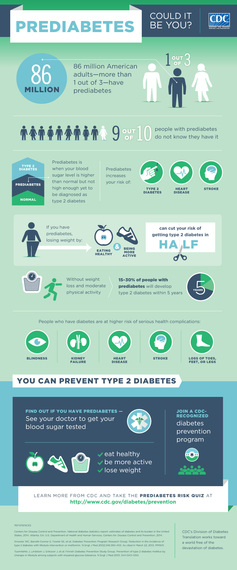
The Center for Disease Control has just reported the number of new cases of diabetes has started to decline for the first time since the disease took off in this country. It's about time and we should do everything we can to ensure the trend-line doesn't reverse.
Like a classic epidemic, diabetes spreads fast and no one is immune. The enormous scale of the Type 2 diabetes crisis makes it almost hard to fathom. According to the Centers for Disease Control and Prevention data, about 27 million have Type 2 diabetes, some eight million don't even know it.
Another 86 million are what's called pre-diabetic, which means they're likely to get it if they don't change their diet and exercise routines.
Think about that next time you're out in public. Chances are that more than a third of every one you run into either has, or is at risk of getting, this disease. And you may be too.
The ranks are growing fast. Between 2000 and 2011, in fact, the number of people with T2 diabetes nearly doubled, and since 2011, it's gone up another 33 percent. Worse still, it's growing rapidly among the young, with more than 5,000 new cases among those under 20 each year. To clarify, Type 1 diabetes (formerly called juvenile-onset or insulin-dependent diabetes) cannot currently be prevented, though important medical advancements are being made.
Overall, these trends are having a huge impact on the nation's well being, its health care system, and the overall economy. Diabetes is a leading cause of heart disease and stroke, blindness, kidney disease, amputations, nerve disease, hearing loss and more.
The National Institute of Health notes that heart disease rates are almost twice as high among diabetics as non-diabetics. Diabetes is costing us adding $176 billion to the nation's health care bill, and costs the economy $69 billion, because of lost productivity, disability and premature death.
I could go on and on. But, here's the good news: Type 2 diabetes is an epidemic we can stop in its tracks. It starts with awareness and behavior modification. The first is challenging, the second often even more so. For starters, what's astounding is how little people know about the disease. A Harris poll found just 21% had a good understanding of it. You can test your own knowledge about Type 2 diabetes and find out if you're at risk by taking this online diabetes risk test.
Bottomline: Type 2 diabetes should be more like an orphan disease rather than an epidemic. In many cases it's the result of bad habits, not bad genes. While it can't be entirely cured, Type 2 diabetes can be avoided and managed.
The scientific literature is clear about the connection between Type 2 diabetes and obesity. The Mayo Clinic reports about 80% of those with the disease are overweight. More than 90 percent of kids with Type 2 diabetes are overweight or obese.
The National Diabetes Education Program has a terrific page listing the steps everyone should take to prevent Type 2 diabetes. Just losing 5-7% of one's body weight "was shown to have a big impact on lowering the risk of diabetes," the site notes. If you've already been diagnosed with diabetes, being accountable for your own health and putting a new structure in place to help facilitate the adoption of new habits is of paramount importance.
Let's resolve to build on the progress that seems to be taking hold and stop diabetes in its tracks, so this runaway epidemic becomes the orphan disease it can and should be.
